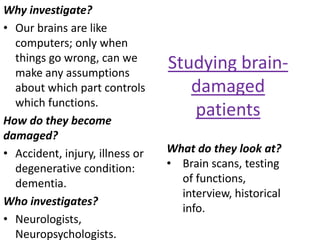Case studies
•Descargar como PPTX, PDF•
2 recomendaciones•274 vistas
Denunciar
Compartir
Denunciar
Compartir

Recomendados
Recomendados
Más contenido relacionado
Similar a Case studies
Similar a Case studies (20)
Coursera work: Understanding the Brain: The Neurobiology of Everyday Life

Coursera work: Understanding the Brain: The Neurobiology of Everyday Life
maleandfemalebrain-whatconstitutesthegender-130731085427-phpapp02 (1).pptx

maleandfemalebrain-whatconstitutesthegender-130731085427-phpapp02 (1).pptx
Diagnosis and Management of Special Populations 2010

Diagnosis and Management of Special Populations 2010
Más de leannacatherina
Más de leannacatherina (20)
Quantitative and qualitative data, questionnaires, interviews

Quantitative and qualitative data, questionnaires, interviews
Case studies
- 1. Why investigate? • Our brains are like computers; only when things go wrong, can we make any assumptions Studying brain- about which part controls damaged which functions. How do they become patients damaged? • Accident, injury, illness or What do they look at? degenerative condition: • Brain scans, testing dementia. of functions, interview, historical Who investigates? info. • Neurologists, Neuropsychologists.
- 2. L/O: to be aware of the rationale and key terms for using case studies to evaluate memory models. Key words • Impaired: • Intact: • Left / right hemisphere: • Frontal, temporal, parietal and occipital lobes:
- 3. L/O: to be aware of the rationale and key terms for using case studies to evaluate memory models. Case Study H.M. K.F. C.W. Why were they studied? What damage did they have to the brain? Impaired? Intact?
- 4. ‘The Man who Mistook his Wife for a Hat’ – Oliver Sacks. • Read pages 7-10. What is impaired vs. intact? Read to the ‘post-script’.